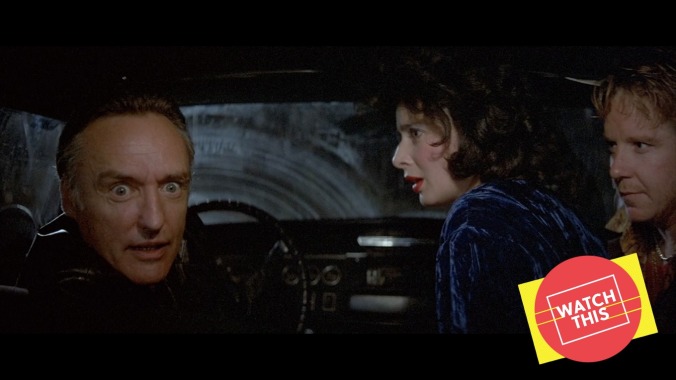In 1986, Dennis Hopper embodied good and evil. The Oscars chose good

Watch This offers movie recommendations inspired by new releases, premieres, current events, or occasionally just our own inscrutable whims. This week: The Academy Awards are Sunday, so we’re looking back on times when an actor was nominated for the wrong film—and on the performance they should have been nominated for that same year.
Blue Velvet (1986)
Academy voters make mistakes for a wide variety of reasons. Sometimes they simply demonstrate poor taste—collectively believing (or at least pretending to believe), for example, that Extremely Loud And Incredibly Close was among the finest cinematic achievements of 2011. Much more frequently, they overlook greatness that was unmistakable to others even at the time, ignoring, say, a performance that swept that year’s critics’ awards. (Most recently, Ethan Hawke in First Reformed.) Actors are nominated in the wrong category (Hawke again!), or recognized for patently subpar work via an ostensibly competitive Oscar that everybody knows is really a lifetime-achievement award, meant to atone for past mistakes (hoo-ah!). Dennis Hopper’s 1986 nomination for Hoosiers, however, may be the most singular aberration in AMPAS history. It’s perhaps the only time that voters were too squeamish to make the correct choice.
That’s not to suggest that Hopper doesn’t do fine work in the film, playing a lost soul who’s given a chance as an assistant high school basketball coach despite his struggles with alcoholism. The role’s sentimentality, however, made it ideal cover for what was then (and still remains, to a large degree, though things are rapidly changing) a very conservative organization, with a membership heavy on retirees. Honoring Hopper for playing Hoosiers’ Shooter Flatch allowed them to avoid honoring Hopper for playing Blue Velvet’s Frank Booth—a performance so horrific and demented that it can be uncomfortable to watch. The Golden Globes nominated him for both films (he still lost, to Platoon’s Tom Berenger), but that’s not an option for AMPAS, which has a dumb rule prohibiting multiple nods for one actor in a single category. So it went with Hoosiers, a cowardly decision that looks even goofier today than it did 35 years ago.
Still, one can empathize. Even more than David Lynch’s other films, Blue Velvet is expressly about Good and Evil, with Frank representing the latter in a way that allows for no comforting distance whatsoever. In lieu of banality, we get terrifying depravity. Frank’s first scene alone, in which he huffs nitrous oxide (or possibly something even more potent) while sexually assaulting torch singer Dorothy Vallens (Isabella Rossellini), sees Hopper disregard any inhibitions to a degree rarely witnessed in mainstream movies. We’re asked to identify with the film’s wholesome, innocent young protagonist, Jeffrey (Kyle MacLachlan), who’s seeing his first indication of what lies beneath small-town America’s placid surface; that shock could have been achieved in any number of more conventionally violent ways, and it’s not at all difficult to imagine actors from Richard Widmark to Willem Dafoe playing a Frank Booth type. (Indeed, Dafoe would subsequently occupy more or less the same space in Lynch’s Wild At Heart.) But almost nobody would be willing to risk embarrassment, and maybe even ostracism, by pushing themselves as maniacally far as Hopper does. Had Blue Velvet been perceived as a failure, it might well have been a career-ender for him.
That wasn’t the case, thankfully. All the same, the idea of celebrating a performance that includes the loudly bellowed line “I’LL FUCK ANYTHING THAT MOVES!” clearly didn’t sit well with many Academy voters. While plenty of nightmarish turns have achieved Oscar glory, those characters tend to be fundamentally civilized; Anthony Hopkins would win Best Actor just five years later for playing a cannibalistic serial killer, but Hannibal Lecter is cultured, intellectual, refined—“so fuckin’ suave,” as Frank Booth would say. Hopper allowed himself to be truly unhinged, so that the moment in Blue Velvet when Frank equates himself with Jeffrey (while looking directly into the camera, i.e. at us), saying, “You’re like me,” makes you feel unclean. Who wouldn’t rather be like a drunk who redeems himself coaching kids?
Availability: Blue Velvet is currently streaming on FUBO. It’s also available to rent or purchase digitally from Amazon, Google Play, Apple, YouTube, Fandango Now, Redbox, AMC On Demand, and VUDU.